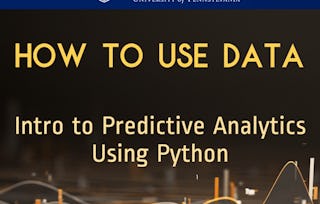This Predictive Modeling with Python course provides a practical introduction to statistical analysis and machine learning with Python. You will learn essential machine learning concepts, methods, and algorithms with a strong emphasis on applying them to solve real-world business and data problems.

Predictive Modeling with Python

Predictive Modeling with Python
This course is part of Applied Data Analytics Specialization

Instructor: Edureka
Included with
Recommended experience
What you'll learn
Manage and preprocess data for statistical analysis and modeling.
Conduct hypothesis testing using advanced statistical techniques.
Build exploratory data analysis (EDA) models to uncover insights.
Build and evaluate models to solve real-world data challenges.
Skills you'll gain
- Statistical Methods
- Scikit Learn (Machine Learning Library)
- Big Data
- Predictive Analytics
- NumPy
- Data Analysis
- Pandas (Python Package)
- Python Programming
- Predictive Modeling
- Machine Learning Algorithms
- Data Preprocessing
- Machine Learning
- Applied Machine Learning
- Data Manipulation
- Statistical Analysis
- Logistic Regression
- Business Analytics
Details to know

Add to your LinkedIn profile
23 assignments
See how employees at top companies are mastering in-demand skills

Build your subject-matter expertise
- Learn new concepts from industry experts
- Gain a foundational understanding of a subject or tool
- Develop job-relevant skills with hands-on projects
- Earn a shareable career certificate

There are 6 modules in this course
In the first module of this course, learners will explore various data types and utilize different measures of central tendency and measures of dispersion to address data inconsistencies.
What's included
12 videos3 readings4 assignments2 discussion prompts
In this module, learners will learn to manage data using probability distribution functions. Learners will start by applying the Bernoulli distribution to model categorical data, explore the Poisson distribution for forecasting, and utilize the Exponential and Normal distributions for regression modeling.
What's included
17 videos3 readings5 assignments
In the third module of this course, Learners will learn to apply the Central Limit Theorem in scenarios where data may be improperly distributed. Identify and analyze sample data, using both parametric and non-parametric methods to handle various test cases for hypothesis testing and decision-making.
What's included
30 videos3 readings5 assignments1 discussion prompt
In the fourth module, learners will explore implementing Exploratory Data Analysis (EDA) on large, complex datasets by conducting both univariate and multivariate analysis. They will also learn how to clean and process data, as well as perform feature engineering to prepare the data for analysis.
What's included
29 videos3 readings4 assignments1 discussion prompt
In this module, learners will learn how to use machine learning models to extract insights from data. They will apply regression and classification algorithms and then optimize the results produced by these models.
What's included
42 videos2 readings4 assignments1 discussion prompt
This module is designed to assess an individual on the various concepts and teachings covered in this course. Evaluate your knowledge with a comprehensive graded quiz on Probability, Statistical Modeling, and Machine Learning.
What's included
1 video1 reading1 assignment1 discussion prompt
Earn a career certificate
Add this credential to your LinkedIn profile, resume, or CV. Share it on social media and in your performance review.
Explore more from Probability and Statistics
 Status: Preview
Status: Preview Status: Free Trial
Status: Free TrialUniversity of Pennsylvania
 Status: Free Trial
Status: Free Trial Status: Free Trial
Status: Free Trial
Why people choose Coursera for their career

Felipe M.

Jennifer J.

Larry W.

Chaitanya A.

Open new doors with Coursera Plus
Unlimited access to 10,000+ world-class courses, hands-on projects, and job-ready certificate programs - all included in your subscription
Advance your career with an online degree
Earn a degree from world-class universities - 100% online
Join over 3,400 global companies that choose Coursera for Business
Upskill your employees to excel in the digital economy
Frequently asked questions
This course is designed with emphasizes on predictive modeling and statistical analysis, providing learners with the skills and methods to examine data, discern trends, and make well-informed forecasts about future results.
Predictive Modeling with Python is tailored for professionals and enthusiasts seeking to deepen their expertise in predictive modeling and statistical analysis, including data analysts, aspiring data scientists, business leaders, and individuals dedicated to data-driven decision-making.
The course spans approximately 6 weeks, allowing flexibility based on the learner's pace, with an estimated weekly commitment of 2-3 hours for lectures, practical projects, and assessments.
More questions
Financial aid available,

